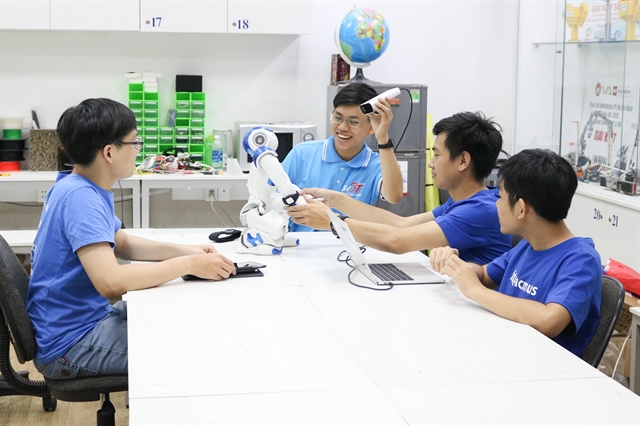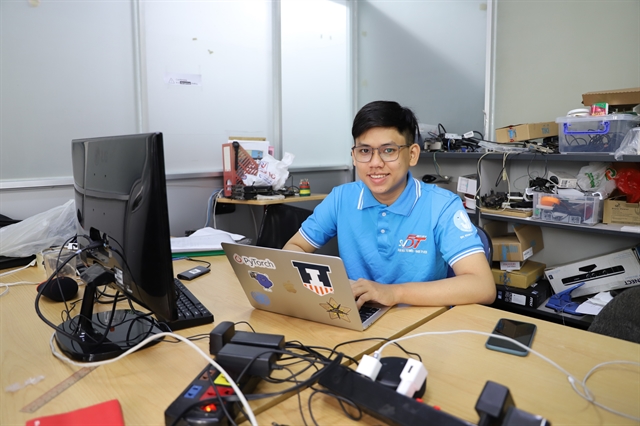 Society
Society


|
| Hoàng Trung Hiếu (third from right) works with his research team members at the University of Science, Vietnam National University-HCM City branch. — VNA/VNS Photos |
HCM CITY — When he was a student at university, Hoàng Trung Hiếu had eight scientific journals presented at international conferences.
His journals studied the application of Artificial Intelligence (AI) and computer vision in addressing health care problems.
After graduating in 2019, Hiếu became a researcher at his school - the University of Science, Vietnam National University HCM City.
In 2019 alone, Hiếu and his research team presented three scientific pieces of research at leading conferences.
The research he feels most proud of is a proposal on a new method of classifying intestinal endoscopy images to help detect common diseases.
The method gives recommendations via images to doctors and helps them diagnose diseases.
The research outcome was reported at the ACM Multimedia Grand Challenges-BioMedia Track last year in Nice, France.
Hiếu’s passion for science began when he was a child.
Born in 1997 in Nha Trang City, central Khánh Hòa Province, Hiếu started to show an interest in technology at an early age.
He took apart all his electronic toys to learn the structure inside and assembled the pieces into new machines.
At primary school, he read books to learn about technology.
Soon realising his passion for science, Hiếu’s father took him to a computer class near his house where Hiếu learned computing and then tried competing in scientific creativity contests at school and district level.
Awards at those competitions motivated him to apply for and pass the exam into the computer class for talented students at Lê Quý Đôn High school in Khánh Hòa.
“When I was in high school, I felt inferior to my classmates. My understanding of science and technology then was very simple. I was not confident standing in front of crowds and talking about something. I thought I could not continue scientific research for the long term.
“But a competition was a turning point for me.”
In 2014, Hiếu, in grade 11, was nominated by his high school to compete in a scientific contest in the southern region for secondary and high school students.
“The experience that I gained from that competition, friends and teachers that I met not only changed my mindset but also inspired me to follow my passion,” he said
He also gained more confidence with second prize in the computer science category and third prize in the final ranking of that competition.

|
| Hiếu at the lab of the University of Science. |
He was admitted without having to take the exam to the Information Technology Faculty of the University of Science, Vietnam National University HCM City where he found AI was his passion.
Taking a fellowship course in the US, scholarships in France, Japan and attending a number of local and international scientific conferences, Hiếu said although AI has not developed in Việt Nam, Vietnamese students and researchers are not inferior to their foreign peers in this sector. What they lack is confidence.
“Foreign students are very active and dare to raise their voice. Vietnamese students are quite reserved, possibly because of lacking confidence in foreign languages.”
He advised young people who are keen on pursuing science to learn soft skills and foreign languages.
“Young people when at school should seek international student exchange opportunities from which they can make friends with foreign peers, learn communication skills and science knowledge, or simply practise team-working skill and improve their foreign language skills.
“At the same time, they should maintain good academic performance and be confident to present ideas to persuade others,” he said.
Hiếu is preparing to embark on doctorate life next year at the University of Illinois, US.
Hiếu said after graduation, he will return to Việt Nam to continue research and contribute innovations to his homeland.
“Each young person should be led by passion and make it motivation on the path of exploring and developing themselves. Determination and patience will lead to success,” he said. — VNS




